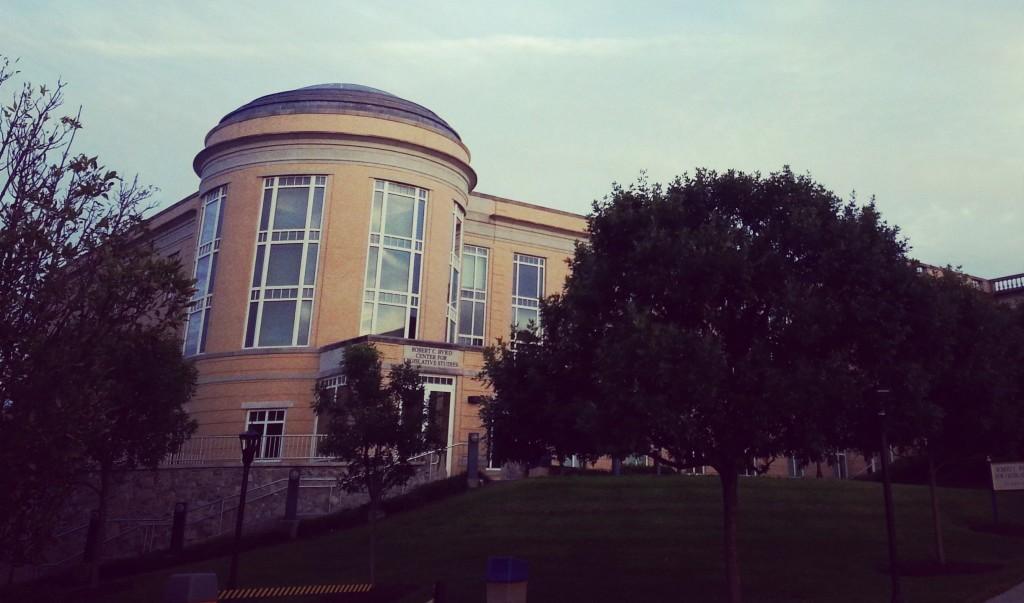Shepherdstown, W.Va., is a beautiful little town that has experienced many things since it was established in 1762. One of the biggest changes to ever come to Shepherdstown was the construction of Shepherd College—now Shepherd University.
Anyone who visits the campus can see that the historic charm of Shepherdstown has been preserved, even with the addition of the university. The buildings stand tall with their proud Roman pillars to serve as facilities that have witnessed the growth of some extraordinary minds.
As the years have continued to wane, new laws and policies have been enacted that have required the university—everywhere in fact—to improve accessibility for the handicapped as a result of the Americans with Disability Act of 1990 (ADA).
Shepherdstown and Shepherd University have made steps of progress in making handicap accessibility better, but there are still a few things that are lacking.
My name is Joe Offutt, and I have been enrolled as a student here since fall 2011. I am sure many of you have seen me on campus.
As a result of a car accident when I was 16 years old, I am paralyzed from my knee down in my right leg. Because of many different kinds of surgeries, I had the experience of navigating the campus (East Campus for the most part) in a manual wheelchair, crutches, cane and walker. Let me tell you, at times it can be quite an ordeal.
Knutti Hall is the building where I have spent the majority of my time studying, but to get to any of the administration offices, the library or the Student Center I have to venture down “The Hill.” Anyone who has had to tackle the hill on King Street on any type of assisted-walking device knows well how difficult this can be.
The sidewalk that leads from Scarborough Library to High Street was a great addition by the university to help rectify this issue. The gravel pathway that connects Knutti Hall with White Hall has been an excellent addition as well, but in times of inclement weather, it is of little use. During rainy weather, the path is slippery—at times with trenches from the rain runoff—and when there is snow the path is unnavigable.
Snow has also been an issue for handicap accessibility this semester. Only so much blame can be placed on Shepherd University for this difficulty, for the snow was managed fairly well. Yet we may still at least acknowledge that the university could have considered the difficulty that people in wheelchairs and on unstable crutches/canes would have getting over large piles of snow to access the sidewalks and their cars.
There is a rug at the entrance of most doors so that water and snow is not brought in, but the steps have nothing for traction and still serve as death traps to not only people on crutches/canes but anyone.
Not only is this an issue on the stairs, but the majority of floors on campus that I have seen have been tile. Tile floors are slippery as well, and I have found myself on many occasions scrambling to keep from falling on them. It seems like such a trivial thing to say we should have something for traction on steps entering and exiting buildings and in the hallways, but it can really make a lot of difference.
A recent graduate of Shepherd, Jessica Ott, said, “I honestly wish they’d just make handicap entrances more easily accessible. Handicap entrances, like into Knutti, are difficult to get to, and you have to wait a long time for the elevator.”
I do not believe that anybody would say that Shepherd University and its campus are not sensitive to handicap accessibility, but I think we all can agree that there are many improvements that can be made to better serve the student, staff and visitor population in terms of handicap accessibility.
User friendly campuses no longer seem a thing of the future. Shepherd University has made efforts to improve its facilities with handicap accessibility at little cost to the historic beauty of the town. Elevators, ramps, and handicap parking spaces have been accounted for and built.
The university and town of Shepherdstown have been successful at making improvements for accessibility, but they have been slow. Even though the improvement of accessibility for the handicap at Shepherd University has been slow, they have been made, but hey—it’s an uphill climb.

